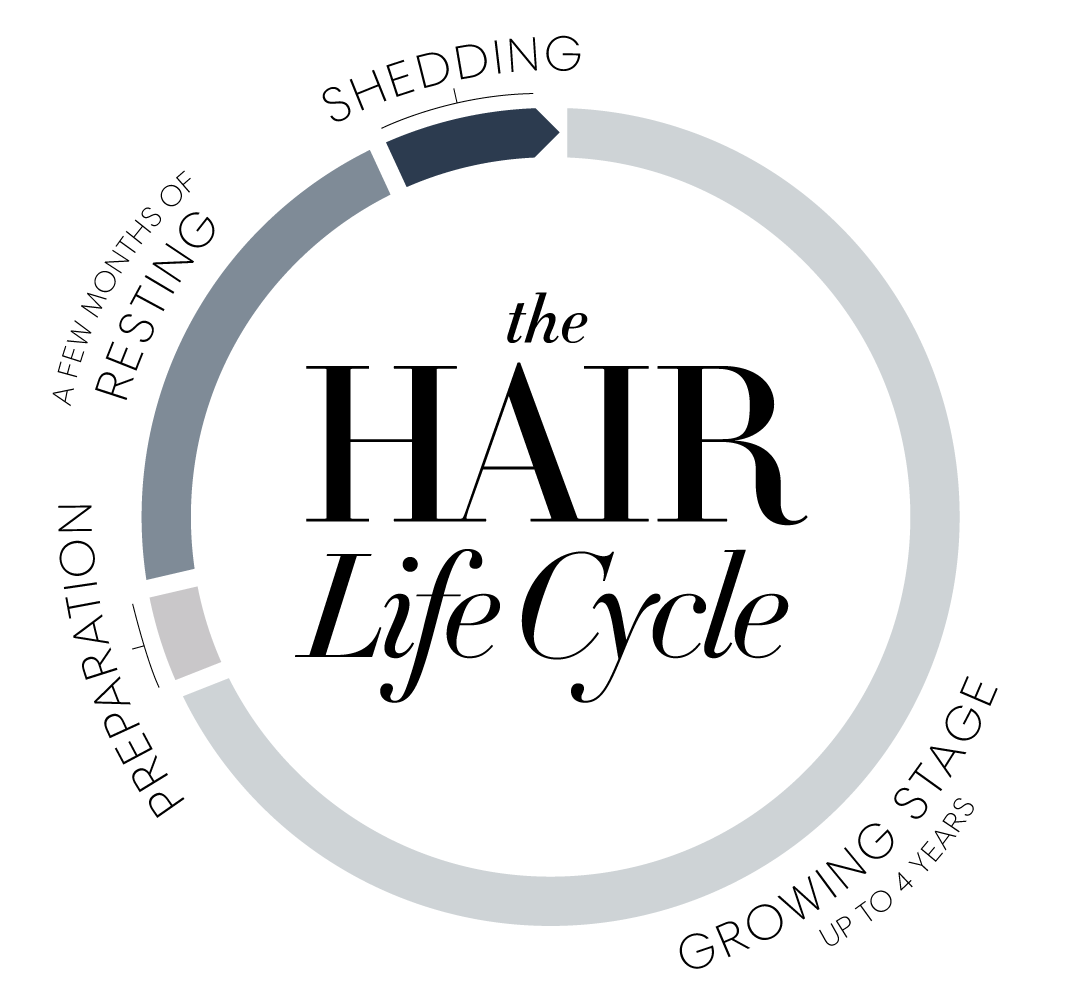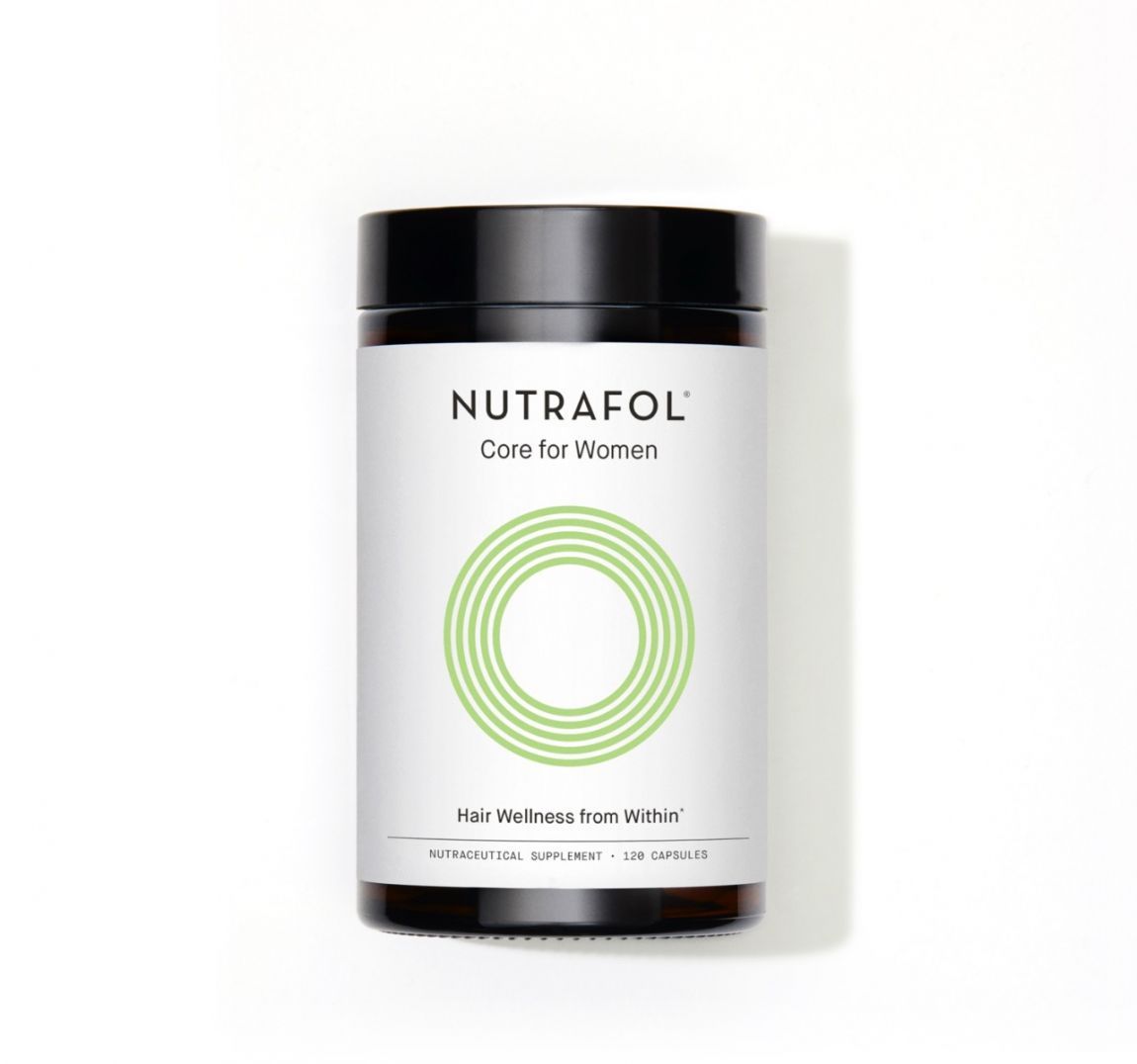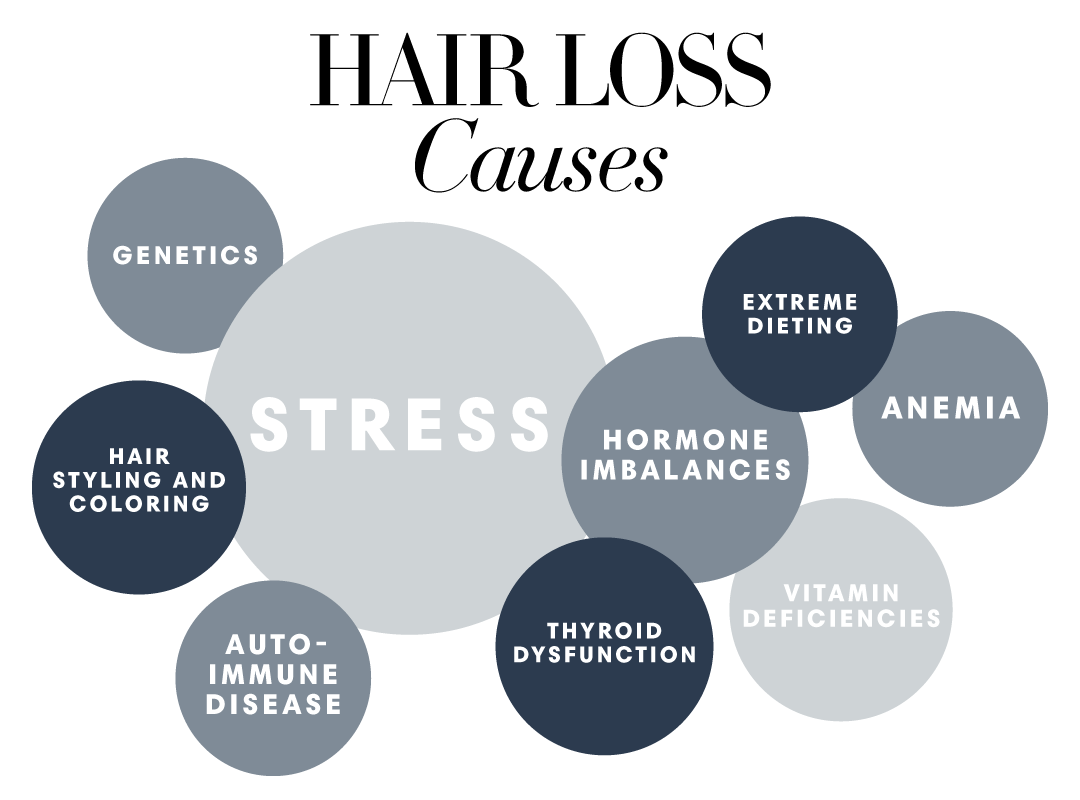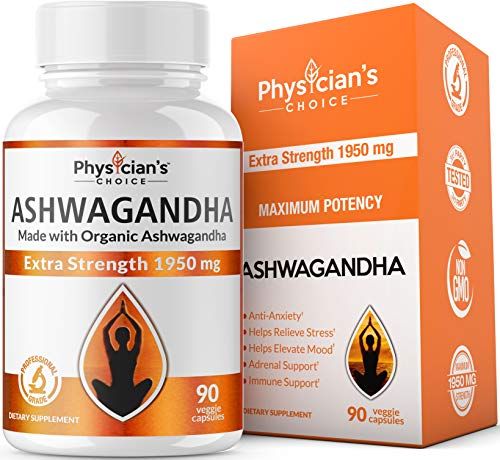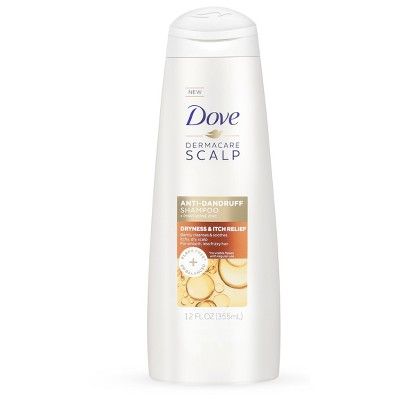About a year ago, a few things in my life began unraveling at once. And nearly three months to the day after my stress levels shot through the roof, the physical manifestation of that anxiety decided to rear its ugly head: My hair began falling out in clumps.
Hair loss and balding isn’t just a male problem, but that doesn’t make the reality of it any less stressful for women. With society beating the “your hair is your crowning glory” message into our heads like a drumbeat we’ve heard on repeat since childhood, there’s no way not to freak out when you discover an unusual amount of loose strands in the shower. And the more you stress about hair loss, the more likely it is that the increase in cortisol will cause even more hair shedding.
Adding insult to injury, when you desperately search for a way to jump off that carousel of hair-shedding hell, the common advice you’ll hear—even from doctors—makes it sound like your solution is waiting with open arms for you at Walmart: just take a biotin supplement.
What is biotin?
How much biotin should you take? No one seems to know the answer. And how, exactly, will biotin help unless you’re one of few people who actually has a biotin deficiency? No one seems to have a clue. I was tested, and did not have a deficiency. But the advice was always the same: fill up your cart with biotin anyway—just in case.
Despite a dearth of scientific evidence proving its efficacy, biotin—a B vitamin found in foods like eggs, salmon, and sunflower seeds that helps the body metabolize fat and carbohydrates—continues to be touted as the single most effective cure for hair shedding and hair loss. It’s an easy solution, and a cheap one, but more experts are now admitting that the biotin connection to hair loss is plain prehistoric. If we’re serious about helping women effectively tackle hair shedding, a more honest and comprehensive approach is vital.
“Despite the public perception that biotin supplements are effective for hair thinning, there is little definitive data to truly support this,” says Dr. Joshua Zeichner, director of cosmetic and clinical research in dermatology at Mount Sinai Hospital. “It is important to perform a thorough evaluation of patients with hair thinning, including a full set of blood tests to evaluate not only biotin levels but also other nutritional deficiencies and potential health issues.”
Why does hair shed, anyway?
In order to properly treat hair shedding, it’s crucial to understand all of the culprits that could be driving this change—and there are more possibilities than you might think.
Healthy hair undergoes three stages during the life cycle, including a growing stage (that can last for years), a short preparation stage, and a few months of resting, explains Dr. Erica Walters, an aesthetic medicine practitioner and medical director at Park Avenue Skin Solutions and Tribeca Wellness Collective. When the resting stage is over, hair sheds normally and the cycle repeats itself. Walters notes that one of the most common causes of excess hair shedding is stress, especially in younger women—which may explain why you’re losing hair before age 30 and years before menopause—but stress may not be the sole factor.
“Other common causes include hormone imbalances (birth control use, pregnancy, or menopause), extreme dieting, anemia, thyroid dysfunction, and certain vitamin deficiencies,” Walters says. “Genetics and auto-immune disease can also cause hair loss and thinning. For all ages, I gather a detailed medical history including diet, exercise, life events and stressors, medication or drug use, and even patterns of hair styling and coloring. Basic lab work would include hormone and thyroid testing, vitamin levels, electrolytes, and a complete blood count to rule out any abnormalities.”
One solution you likely won’t encounter at Walter’s office? You guessed it: biotin.
“Biotin is a water-soluble vitamin that has many roles in the body, and has dominated the spotlight as a hair growth vitamin,” Walters says. “However, there is minimal scientific evidence that biotin alone has a dramatic effect on hair growth or health, and I would not recommend it as a solo treatment because the key to treating hair loss is a holistic approach.”
So why is biotin so popular?
The fact that rumors and confusion still swirl around discussions about supplements like biotin also relates to why biotin was able to rise up and become the gold standard in hair loss therapy. If there’s one major shortcoming many doctors will share about medical school training, it’s this: a lack of focus on nutritional science.
“Medical education often entirely excludes nutrition science, or may have a rudimentary introduction at best,” says Dr. Reena Rupani Goyal, a board-certified dermatologist at Mount Sinai Hospital. “We are taught that diabetics should avoid carbs and cardiac patients should avoid red meat and salt—but the role of dietary triggers of inflammation, for example, is not something that is explicitly taught in medical school. Botanical supplements and herbal preparations are not discussed.”
Zeichner agrees and stresses the importance of collaborating with other medical professionals to address that gap in nutritional and alternative medicine training.
“Medicine can become very subspecialized, so it is important to continue to educate ourselves on all aspects of our patients’ lives that may affect their health,” Zeichner says. “In some cases, we collaborate with our colleagues in other specialties, such as nutritionists, who offer specialized advice that we may not be trained to give ourselves. As dermatologists, many of us have relatively little knowledge of basics of nutrition.”
If biotin doesn’t really work, then what does?
The modern wellness movement, though trendy in a way that raises some eyebrows and is undoubtedly imperfect (the FDA still isn’t authorized to review dietary supplements), could also serve as a bridge that takes us from the biotin hair loss “solution” that rarely works to innovative procedures and herbal treatments that really, truly (honestly) can help hair shedding and encourage regrowth.
One such product that is slowly gaining recognition, though it’s still far from enjoying the celeb status of biotin, is Nutrafol, a drug-free hair growth supplement that is formulated with a wide variety of natural ingredients that include ashwagandha, hydrolyzed marine collagen, saw palmetto, and biocurcumin. For the sake of full disclosure, after experiencing stress-related hair shedding, I began taking Nutrafol for women (the brand sells a separate supplement for men that addresses testosterone and hormonal differences). My hair shedding nearly completely stopped after about three months of daily usage; this was after I had tried several other supplements prior to Nutrafol, including ingestible and topical biotin.
“It was important for us to have proof that an ingredient at a certain dose had clinical efficacy,” says Roland Peralta, president of Nutrafol and a cancer survivor who was able to address his own hair loss through Nutrafol’s many natural ingredients. “We sought out R&D partners in the nutraceutical sector with plant medicines that had clinical studies proving efficacy on the use of standardized phytoconstituents. This is next level research and extraction methods. There are over 12 patents on our botanicals and over 15 clinical studies. Most supplements on the market borrow science and add a sprinkle of an ingredient than makes a claim that cannot be supported by research. Efficacy was non‐negotiable for us.”
In other words, all natural hair-loss supplements are not created equal, no matter what buzz you hear about a star ingredient. It’s important to address cortisol levels that contribute to stress-related hair loss, as well as any underlying inflammation that can weaken hair follicles.
“Inflammation interferes with signaling molecules that control the biological clock of the hair growth cycle, pushing follicles into the resting phase, telogen,” Peralta says.
Although biotin is included in Nutrafol (because, though rare, a biotin deficiency will compromise hair health), Peralta makes no bones about it: When it comes to touting biotin as a hair-growth miracle, that’s nothing but “fake news.”
“In May 2017, in the Journal of Drugs and Dermatology, Dr. Jerry Shapiro and his team did a comprehensive meta‐analysis of the scientific literature and conclusively determined that there is absolutely no scientific evidence supporting the use of biotin for hair loss,” Peralta says. “They concluded that it was nothing less than a media infatuation that somehow has trickled down to rock star status for a solution for hair loss.”
Is there a natural solution?
If any natural ingredient deserves a little more love, it’s ashwagandha, an Indian medicine herb that comes from a family of plants called adaptogens, which date back thousands of years in use in traditional Indian Ayurvedic medicine, according to Rupani Goyal. “Adaptogens help the body normalize physiologic responses to stress, such as cortisol release, and in this way can be helpful in managing hair loss,” Goyal says.
Perhaps because natural medicinal alternatives are not prescribed by most doctors, it’s tempting to think you can DIY a hair loss solution by buying a few herbs off of Amazon, rolling up your sleeves, and creating elixirs in your kitchen. But Goyal reminds us that herbs are powerful and many of our prescribed medications actually originated in plants.
“Safety is a real concern,” Goyal says. “As such, not only is it vital to have a complete understanding of human physiology before recommending a supplement, but if someone is attempting to actually create an herbal remedy, having the involvement of a plant scientist or chemist is also important.”
What should I do if my hair is shedding?
If you’re suffering from hair loss and hair shedding, one of your first steps should be to make an appointment with a board-certified dermatologist for a full examination of the scalp, blood work, and a discussion about new, innovative treatments that can help, Zeichner says.
“You may get recommendations for over-the-counter treatments like Rogaine or supplements like Viviscal,” Zeichner says. “If you have dandruff in the skin you may get a recommendation for a dandruff shampoo like Dove Derma Care scalp, which contains zinc pyrithione, an ingredient that helps lower levels of yeast on the scalp, which promotes inflammation and can contribute to hair thinning.”
Other in-office procedures that can help with hair loss include platelet rich plasma (PRP), in which your own blood is processed to separate out red blood cells from the serum, which contains high levels of growth factors. “These growth factors are then injected directly to the areas where the hair is thinning to help promote optimal growth of the hair in those areas,” Zeichner says.
The average cost for one PRP treatment in New York City is $1,000, according to Zeichner, who says he treats patients once per month for four months and then provides maintenance treatments every four to six months afterward. “During the first few months the goal of treatment is to minimize hair shedding,” Zeichner says. “After three months or so, patients start to notice new hair regrowth. I look at PRP like a fertilizer for your hair follicles. They help lazy follicles grow up to the best of their potential.”
The effectiveness rate for platelet rich plasma treatments varies from patient to patient, but Zeichner says anecdotally his patients achieve about a 25 percent improvement and hair density. But PRP isn’t for everyone. “I find that ideal candidates are people who are starting to lose hair or who have hair that just does not grow,” Zeichner says. “If you have a significant, long-standing baldness, PRP may not be the ideal treatment for you.”
Walters, who also performs PRP on many patients going through hair loss, says other treatments could include hormone replacement therapy in pre-menopausal and menopausal women, as well as iron supplementation in anemic patients. Custom blended topical treatments that include poly-peptides and prescription-based hair growth medications based on their specific hair loss pattern are another viable option.
Source: Read Full Article
